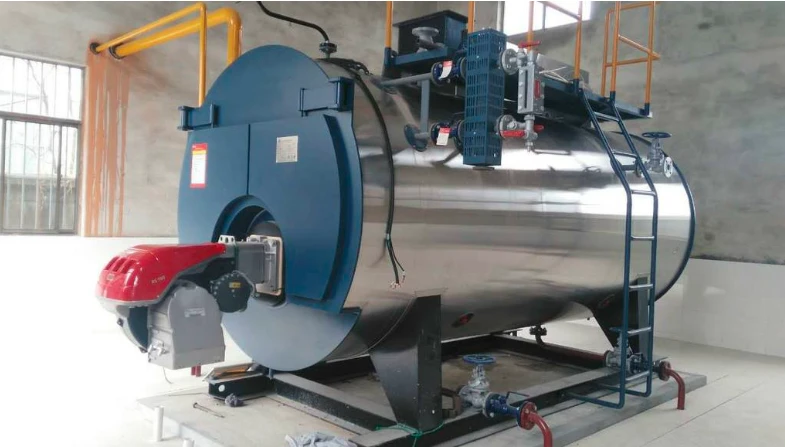
Dec . 03, 2024 18:00 Back to list
coal fired thermal oil boiler
Coal-Fired Thermal Oil Boilers An Overview
Coal-fired thermal oil boilers play a significant role in various industrial applications, particularly in sectors requiring high-temperature heat. These systems utilize coal as a primary fuel source to generate thermal oil, which then circulates through the process, providing efficient heating solutions. This article delves into the operation, advantages, challenges, and environmental concerns associated with coal-fired thermal oil boilers.
Operation of Coal-Fired Thermal Oil Boilers
The fundamental principle of a coal-fired thermal oil boiler involves burning coal to produce heat, which is then transferred to thermal oil circulating through the system. The boiler consists of a furnace, where the coal is combusted, and a series of heat exchangers that facilitate the transfer of heat to the thermal oil.
The coal is fed into the furnace, where it is ignited to generate combustion gases. These gases pass through heat exchange tubes, transferring their heat to the thermal oil. The thermal oil, heated to high temperatures, is then pumped through a closed-loop system to various applications, such as heating processes in chemical manufacturing, food processing, or textile production.
The operational efficiency of these boilers is critical; it can directly affect the energy consumption and operational costs of industrial processes
. Modern coal-fired thermal oil boilers are equipped with advanced combustion technology, enabling them to achieve better efficiency and reduce emissions compared to older models.Advantages of Coal-Fired Thermal Oil Boilers
One of the primary advantages of coal-fired thermal oil boilers is their ability to generate and maintain high temperatures without requiring high-pressure systems. The thermal oil used in these systems can reach temperatures of up to 300°C (572°F) while operating at atmospheric pressure, making it a safe and efficient option for many applications.
Additionally, coal is often more economical than other fuel sources, particularly in regions where it is abundantly available. This cost-effectiveness is coupled with the ability to provide continuous heat over extended periods, making coal-fired thermal oil boilers ideal for industries with high heat demands.
Furthermore, these boilers can be designed to accommodate various coal types, allowing for flexibility in fuel selection based on availability and cost. This versatility enables industries to optimize their fuel usage based on market conditions.
coal fired thermal oil boiler

Challenges and Environmental Concerns
Despite their advantages, coal-fired thermal oil boilers face significant challenges, particularly regarding environmental impact. Burning coal releases carbon dioxide (CO2), a greenhouse gas that contributes to global warming. Moreover, the combustion process can produce sulfur dioxide (SO2), nitrogen oxides (NOx), and particulate matter, which pose health risks and contribute to air pollution.
Regulatory pressures are increasing worldwide to reduce emissions from fossil fuels, pushing industries to seek cleaner alternatives. As such, many companies are exploring options like biomass, natural gas, or even transitioning to renewable energy sources.
Another challenge is the efficiency of coal combustion. Incomplete combustion can lead to unburned coal particles, which increase emissions and waste. Modern coal-fired thermal oil boilers must incorporate advanced burner technologies and emission control systems to ensure compliance with environmental regulations and improve overall combustion efficiency.
The Future of Coal-Fired Thermal Oil Boilers
The future of coal-fired thermal oil boilers will likely hinge on advancements in technology and emission reduction strategies. Innovations such as integrated carbon capture and storage (CCS) technologies may provide pathways to mitigate the environmental impact of coal usage. These technologies can capture CO2 emissions before they are released into the atmosphere, allowing industries to continue using coal while addressing climate concerns.
Moreover, the shift towards sustainable practices may lead to the development of hybrid systems that combine coal with renewable fuels or utilize waste heat recovery solutions, enhancing overall efficiency and reducing reliance on coal alone.
Conclusion
Coal-fired thermal oil boilers remain an essential component in many industrial applications due to their efficiency and cost-effectiveness. However, the increasing focus on sustainability and environmental stewardship is pushing industries to reassess their reliance on coal. With advancements in technology and a shift towards cleaner energy sources, the landscape of energy production and usage in industry is evolving. As companies adapt to these changes, coal-fired thermal oil boilers will need to incorporate greener practices to thrive in an environmentally conscious future.
-
Best Steam Boiler Design PDF Free Design Calculation & Diagram Downloads
NewsJun.10,2025
-
Hot Boiler Water Heater Efficient Heating Solutions for Home & Commercial Use
NewsJun.10,2025
-
Steam Boiler Safety Devices High-Quality Protection Valves
NewsJun.10,2025
-
Ultimate Steam Boiler Checklist for Safety & Efficiency
NewsJun.10,2025
-
Optimal Hot Water Boiler Temperature Setting Guide
NewsJun.10,2025
-
Effective Hot Water Boiler Chemical Treatment Protect & Maintain
NewsJun.09,2025
Related PRODUCTS






















